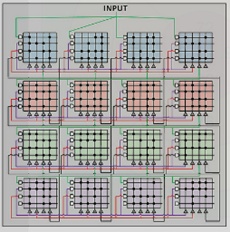IBM unveils chip that mimics human brain to process data
08 Aug 2014
In what promises to be a major breakthrough in chip design, International Business Machines Corp unveiled a "brain-like" computer chip yesterday that is the size of a postage stamp, Reuters reported.
 The chip is capable of processing massive amounts of data even as it handled inputs from many different sources, the company said.
The chip is capable of processing massive amounts of data even as it handled inputs from many different sources, the company said.
The company had a month back unveiled a $3 billion investment over the next five years in chip research and development aimed at finding a game-changing breakthrough to revive its slumping hardware business.
IBMs new chip differs in several respects from most which operate on pre written paths. It processes data in realtime and is capable of dealing with ambiguity, the company said. The energy consumption of the chip is equivalent to that of a hearing aid.
The chip, built on Samsung Electro-Mechanics Co Ltd's 28nm process technology, consumes 70mW of energy.
The product of a decade of research, the chip seeks to mimic the human brain's high cognitive power and low-energy use.
After years of collaboration with IBM, the researchers were now a step closer to building a computer similar to our brain, professor Rajit Manohar at Cornell Tech, where the chip was designed said, reports Reuters.
Researchers developing the chips said they had created a 4,096-core processor that simulated a million neurons.
IBM packed 16 of the TrueNorth chips on one circuit board to model "sixteen million programmable neurons and four billion programmable synapses" to test the product.
"We foresee new generations of information technology systems – that complement today's von Neumann machines – powered by an evolving ecosystem of systems, software, and services," said Dr Dharmendra S. Modha, chief scientist of IBM Research's Brain-Inspired Computing team, in a statement.
The focus at the moment is on density and power – 20mW per cm2, to allow the technology to be squeezed into pockets or tiled into huge fields to build "neurosynaptic supercomputers" with hundreds of trillions of synapses.
According to Dr Modha, the brain-inspired chips could transform mobility, via sensory and intelligent applications that could fit in the palm of one's hand but without the need for Wi-Fi, suggesting gadgets need not have to rely on cloud-based systems like Siri and Google Now to make complex decisions.


















